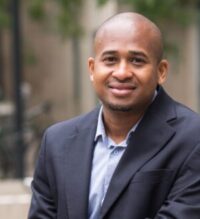Dennis Jones, PhD, Awarded Department of Defense Grant to Better Understand, Treat Lymphedema
 Dennis Jones, PhD, assistant professor of pathology & laboratory medicine, has been awarded a two-year, $330,000 grant from the Department of Defense for his research, “Enhancing Lymphatic Function with Transplanted Muscle Cells after Bacterial Infection.”
Dennis Jones, PhD, assistant professor of pathology & laboratory medicine, has been awarded a two-year, $330,000 grant from the Department of Defense for his research, “Enhancing Lymphatic Function with Transplanted Muscle Cells after Bacterial Infection.”
Lymphedema is a disease where there is an accumulation of protein-rich fluid called lymph due to dysfunctional lymphatic vessels. This fluid can create a favorable environment for bacterial growth and increase the risk of skin and soft tissue infections (SSTIs). Additionally, lymphedema can also weaken the immune system, making it harder for the body to fight infections. SSTIs, in turn, further damage the lymphatic vessels and worsen the symptoms of lymphedema.
As part of this discovery grant, Jones will conduct experiments to better understand how SSTIs cause lymphatic vessel dysfunction. “First, we will identify changes in gene expression in single cells collected from lymphatic vessels after methicillin-resistant Staphylococcus aureus (MRSA) infection and determine whether MRSA leads to greater alterations to these cells than a less virulent form of bacteria. We anticipate that these studies will provide us with greater insight into how bacteria affect the composition and function of cells of the lymphatic vessels,” explains Jones.
Jones and his team then will investigate whether lymphatic muscle cells (LMCs) that normally propel lymph can repair and heal after a MRSA infection. They will then use markers to detect LMC growth after infection and measure if they replace the damaged cells. By doing so, they can determine the extent of the damage caused by the infection and the effectiveness of the regeneration process.
Since Jones and his team previously found that lymphatic vessel contractility does not return after MRSA infections, the Jones Lab will collaborate with Darrell N. Kotton, MD, who is the David C. Seldin Professor of Medicine at the school and Director of the Center for Regenerative Medicine (CReM) of Boston University and Boston Medical Center, to test whether stem cell-derived smooth muscle cells (SMCs) could serve as a therapeutic strategy to enhance the function of lymphatic vessels. These studies will help determine whether SMCs derived from a patient’s own cells have the ability to repair damaged lymphatic vessels. “The potential application of this technique for people with lymphedema whose lymphatic vessels are malfunctioning may be very promising if we find that SMCs can attach to lymphatic vessels and restore their contractility,” said Jones.
Jones earned his bachelor’s in biology at Morehouse College and then went on to earn his PhD in immunobiology from Yale University. After completing his doctoral work in 2012, he completed a post-doctoral fellowship in radiation oncology at Massachusetts General Hospital. In addition to receiving numerous prestigious awards, Jones was named a STAT News Wunderkind in 2018 and received an American Society for Investigative Pathology (Fred Sanfilippo) Visiting Lectureship Award in 2022.
View all posts